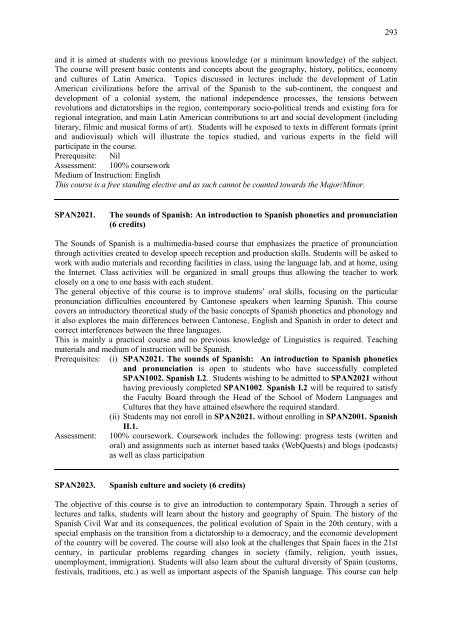(BA) (4-year-programme) - The University of Hong Kong
(BA) (4-year-programme) - The University of Hong Kong
(BA) (4-year-programme) - The University of Hong Kong
You also want an ePaper? Increase the reach of your titles
YUMPU automatically turns print PDFs into web optimized ePapers that Google loves.
293and it is aimed at students with no previous knowledge (or a minimum knowledge) <strong>of</strong> the subject.<strong>The</strong> course will present basic contents and concepts about the geography, history, politics, economyand cultures <strong>of</strong> Latin America. Topics discussed in lectures include the development <strong>of</strong> LatinAmerican civilizations before the arrival <strong>of</strong> the Spanish to the sub-continent, the conquest anddevelopment <strong>of</strong> a colonial system, the national independence processes, the tensions betweenrevolutions and dictatorships in the region, contemporary socio-political trends and existing fora forregional integration, and main Latin American contributions to art and social development (includingliterary, filmic and musical forms <strong>of</strong> art). Students will be exposed to texts in different formats (printand audiovisual) which will illustrate the topics studied, and various experts in the field willparticipate in the course.Prerequisite: NilAssessment: 100% courseworkMedium <strong>of</strong> Instruction: EnglishThis course is a free standing elective and as such cannot be counted towards the Major/Minor.SPAN2021.<strong>The</strong> sounds <strong>of</strong> Spanish: An introduction to Spanish phonetics and pronunciation(6 credits)<strong>The</strong> Sounds <strong>of</strong> Spanish is a multimedia-based course that emphasizes the practice <strong>of</strong> pronunciationthrough activities created to develop speech reception and production skills. Students will be asked towork with audio materials and recording facilities in class, using the language lab, and at home, usingthe Internet. Class activities will be organized in small groups thus allowing the teacher to workclosely on a one to one basis with each student.<strong>The</strong> general objective <strong>of</strong> this course is to improve students’ oral skills, focusing on the particularpronunciation difficulties encountered by Cantonese speakers when learning Spanish. This coursecovers an introductory theoretical study <strong>of</strong> the basic concepts <strong>of</strong> Spanish phonetics and phonology andit also explores the main differences between Cantonese, English and Spanish in order to detect andcorrect interferences between the three languages.This is mainly a practical course and no previous knowledge <strong>of</strong> Linguistics is required. Teachingmaterials and medium <strong>of</strong> instruction will be Spanish.Prerequisites: (i) SPAN2021. <strong>The</strong> sounds <strong>of</strong> Spanish: An introduction to Spanish phoneticsand pronunciation is open to students who have successfully completedSPAN1002. Spanish I.2. Students wishing to be admitted to SPAN2021 withouthaving previously completed SPAN1002. Spanish I.2 will be required to satisfythe Faculty Board through the Head <strong>of</strong> the School <strong>of</strong> Modern Languages andCultures that they have attained elsewhere the required standard.(ii) Students may not enroll in SPAN2021. without enrolling in SPAN2001. SpanishII.1.Assessment: 100% coursework. Coursework includes the following: progress tests (written andoral) and assignments such as internet based tasks (WebQuests) and blogs (podcasts)as well as class participationSPAN2023.Spanish culture and society (6 credits)<strong>The</strong> objective <strong>of</strong> this course is to give an introduction to contemporary Spain. Through a series <strong>of</strong>lectures and talks, students will learn about the history and geography <strong>of</strong> Spain. <strong>The</strong> history <strong>of</strong> theSpanish Civil War and its consequences, the political evolution <strong>of</strong> Spain in the 20th century, with aspecial emphasis on the transition from a dictatorship to a democracy, and the economic development<strong>of</strong> the country will be covered. <strong>The</strong> course will also look at the challenges that Spain faces in the 21stcentury, in particular problems regarding changes in society (family, religion, youth issues,unemployment, immigration). Students will also learn about the cultural diversity <strong>of</strong> Spain (customs,festivals, traditions, etc.) as well as important aspects <strong>of</strong> the Spanish language. This course can help
















